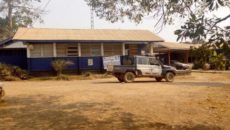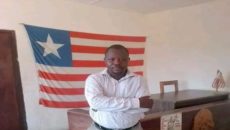The first presidential debate to feature top candidates concluded with Alexander Cummings of the Alternative National Congress emerging as the clear winner.
Cummings came prepared to articulate his vision for the country and propose concrete plans, answering all questions posed by the moderators, while some participants, noticeably Unity Party’s Joseph Boakai, sidestepped numerous questions.
The vice president appeared to give the most underwhelming performance in the debate, avoiding important questions for voters by offering ambiguous metaphors as answers.
When asked about why he couldn’t achieve much along the line of poverty reduction while in the current government, Boakai only response was, “You put a race car in the garage and you say you want that car to be proven. Put the race car on the track.â€
Along that line, when answering about his plan to reduce poverty, he said, “Roads, roads, roads†and did not expand on how he would pay for it, as originally asked by the moderator.
Asked about what he would do to achieve a balanced budget, Boakai reiterated lines he had used in a Newsweek interview that Liberia is “too donor-dependent.â€
“An overprotected child cannot be self-reliant,†he added, consistent with the numerous parables he threw out during the debate. But he avoided providing any specifics besides touting his years of experience in the government.
“I’m happy that my counterparts are always calling my name when they speak – experience,†Boakai said. “If we just spend that which we have, we’ll avoid all of the problems that we have with excesses.â€
When all his fellow candidates were promising to reduce their own salaries and those of others in the executive branch, Boakai joked, “Thank God to the Ellen Johnson Sirleaf government that people now know what people in government make.â€
“Knowing the problem is part of knowing the solution,†he said, before dodging a follow-up question by a moderator on whether he would commit to reducing salaries.
On an issue that many Liberians feel strongly about, Boakai explained the high salaries for government employees by saying it was important that there was “a future for people when they leave government,†essentially describing government work as a means of securing a retirement plan.
Another key question where Boakai proffered an ambiguous response dealt with the current stalemate between the Supreme Court and the National Legislature.
Likely because he has been endorsed by most lawmakers, Boakai refrained from picking any side.
“The courts are protected by law, so is the legislature,†he said. “An eminent lawyer has just said it,†he added, partially jumping on Liberty Party’s Charles Brumskine’s bandwagon. But he declined to “render judgment,†however, he said, “I know we have to adhere to the laws of this country.â€
When pushed by the moderators to take a stand, he replied, “For me, I wait for the outcome.â€
On the issue of what he would do to address the rampant rape cases in Liberia, Boakai said there is a need for “people at the courts and police station to ensure that people who commit crimes are held accountable.â€
He then talked about ensuring that young girls know how to protect themselves, a territory that some activists may consider to be “victim blaming†because of the appearance of absolving rapists of the responsibility to not rape and throwing the duty on victims to protect themselves.
Boakai’s best chance to attack issues head on without many repercussions came during the discussion of the Congo-native debate that has seeped into national politics. But Boakai, whose campaign team is recently best known for more openly pushing the divisive narrative, was vague in his response.
“For us, we have already committed ourselves to an inclusive government,†Boakai said. “I don’t believe in divide and rule.â€
It was the All Liberian Party’s Benoni Urey who announced that he would be “as candid on this matter as possible,†bringing up the issue of a poster of Boakai and Nuquay that labeled them as the “indigenous ticket.â€
Urey went as far as defending the vice president: “All my life I’ve known Joe Boakai, he’s given me no reason to believe that he’s a tribalist.†He did take a slight swipe at Boakai when he added, “People will do anything to win.â€
Indeed, as candid as that response was, so was the rest of Urey’s performance during the debate. He may have emerged as the second-best performer on the stage, although his statements were riddled with fumbles.
For example, when explaining his plan to reduce the deficit, he misspoke when he said, “Rather than having a minister ride an $80,000 car, he will ride a $20 Hyundai.â€
Urey also made light of the execution of cabinet members by former President Samuel Doe when describing the serious case of corruption now. He suggested that Doe would have to kill even more people if he saw how bad corruption was now.
On the issue of security, Urey said he would create a Ministry of National Security (which Liberia previously had) because all the security apparatus should not have to report directly to the president. But the army and other military arms are already under the Ministry of National Defense. Additionally, the Liberia National Police is contained within the Justice Ministry.
In fact, it appeared that Urey’s solution for almost every problem was for the creation of a new government agency, even if such agency already existed, such as a court specifically for sexual crimes.
He proposed reconstituting the Agricultural Cooperative Development Bank, an idea Brumskine has pushed in the past. He also said he would reopen the National Housing Bank to allow “poor people†to “get loans to be able to get places to live.â€
As a trained planner, he pushed for creating a Ministry of Planning and Development as a means of better controlling the budget deficit.
In fact, the only issue Urey pushed more than creating new government institutions was the need for “experienced people.†He said while the Finance Ministry has had many smart young ministers, he suggested that more “experienced people†might accomplish better results.
Urey appeared to perform better than Brumskine because his passion shone brighter than the lawyer’s, who appeared too rehearsed and lacked the genuine passion that Urey and Cummings exhibited.
He made statements like “I do not subscribe to poverty reduction; I believe in poverty alleviation†that was empty in meaning and seemed crafted to score easy points with the crowd.
Brumskine also took a few unpopular positions such as when he declared that “a budget deficit is not necessarily a bad thing.â€
The Liberty Party standard bearer did make some important points when he drew attention to the fact that government vehicle salvage values are often not reclaimed. Additionally, he promised to end the practice of distributing gas slips and replacing it with a system that tracks the specific vehicle being refueled and the amount of gas used by drivers of government vehicles.
He occasionally emphasized that his past experience in government made him equipped to head the country. But he made a point to distinguish himself from the vice president when he said “I’m one of the few government officials who was asked to leave government because I was advocating for the Liberian people… So I don’t want the vice president to confuse me and him when it comes to experience. My experience is a good experience that the Liberian people need to run this country.â€
Brumskine was strongest in response to questions on the rule of law. In fact, his answers must have been so good that his fellow competitors deferred to the judgment of the veteran lawyer on those issues.
When speaking of his plans to reduce sexual assaults, his description of his relationships with his wife, mother, and daughter appeared to be one of the most genuine moments for Brumskine during the debate.
“Three of the people who I love the most happen to be women,†he said, adding that “the least I can do is to show to every woman in this country that I have your back.â€
Unlike the other candidates, Cummings’ performance revealed a level of preparation mixed with candor. He stuck to a theme of increasing the economic pie in his response to most questions.
“I’m becoming a broken record,†he said when asked about peace and reconciliation. “It comes back to the economy. If we grow this bowl of rice and all Liberians can put their spoon in and have access to it, it will help in this reconciliation process.â€
Cummings’ best area of performance was unsurprisingly on questions related to the economy. He answered all questions asked and put forth concrete solutions.
For example, to address waste in government, he said, “We have to look at our procurement practices and are we paying fair value for what the government procures?â€
He moved on to listing expensive cars, people traveling in “the wrong class of travel,†“seepage and rent seeking,†as ways through which the government loses money unnecessarily.
He espoused an idea accepted by most economists that “putting money into the hands of many, as opposed to a few, stimulates the economy.â€
Ultimately, the format of the debate where there were approximately three minutes for each candidate to respond to questions could not allow the candidates to provide detailed explanations of their plans for the country but Cummings used the format to his advantage, beginning and ending with the common saying, “The best predictor of future performance and behavior is past performance and behavior.â€
For Cummings, who doesn’t have a long history of having worked under the scrutiny of Liberians, nor in government, voters’ adherence to this statement was certainly in his best interest.
Featured photo screenshot of KMTV Broadcast



